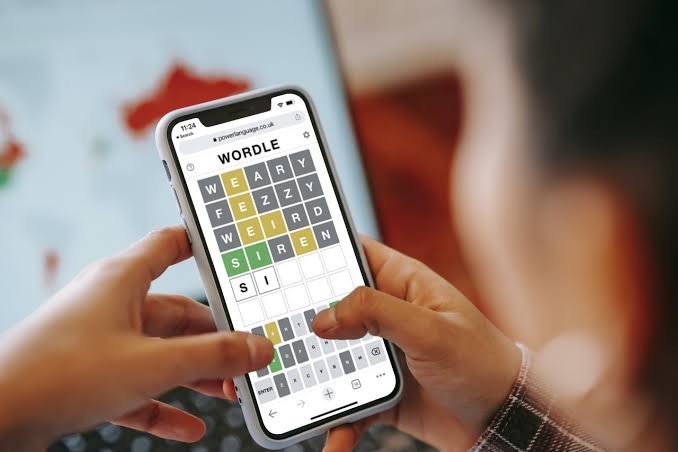Ready to unlock the puzzle and dive into the addictive world of Wordle? Brace yourself for a mind-boggling adventure that has taken the internet by storm! In this blog post, we’ll unravel the viral phenomenon behind Wordle – an online word-guessing game that has captured our attention and ignited our competitive spirit. From its humble beginnings to becoming a global sensation, we’ll explore why Wordle is so incredibly popular and addictive. So sit back, relax (or get ready for some serious brainstorming), as we embark on this journey to understand what makes Wordle tick and how you can master it like a pro. Get ready to flex those word muscles because once you start playing, there’s no turning back!
Wordle: What is it and how does it work?

Wordle, the word-guessing game that has taken the internet by storm, is a captivating and addictive puzzle that challenges players to unravel a hidden five-letter word within six attempts. The objective seems simple enough – guess the correct word using a series of letter combinations. But don’t be fooled by its apparent simplicity; Wordle requires both skillful deduction and a touch of luck.
Each round begins with an empty grid where players can input their guesses. After submitting each attempt, Wordle provides feedback through color-coded squares – yellow for correct letters in the right position, and gray for correct letters but in the wrong place. Armed with this information, players must strategically analyze their previous guesses to narrow down potential words until they finally crack the code.
The beauty of Wordle lies in its simplicity yet complexity – it’s easy to grasp but challenging to master. With every incorrect guess, players are forced to reevaluate their strategies and consider alternative possibilities. It’s like a linguistic workout for your brain as you stretch your vocabulary muscles and sharpen your problem-solving skills.
As you delve deeper into this captivating game, you’ll quickly realize that there is more than one way to approach solving these puzzles. Some swear by systematic guessing patterns while others rely on intuition or even educated hunches based on common English language patterns.
But remember – patience is key! Don’t get discouraged if success doesn’t come immediately. Take your time analyzing feedback from each guess and use it as valuable information to guide future attempts.
So whether you’re looking for a mental challenge during your lunch break or simply seeking some fun-filled entertainment at any time of day, Wordle offers an exciting escape into the world of mind-bending wordplay. Prepare yourself for hours of thrilling gameplay as you rack your brain trying to uncover those elusive five-letter words!
Stay tuned as we dive deeper into what makes Wordle such an addictive phenomenon and explore strategies that will help elevate your Wordle skills to the next level. Get ready to join the ranks of word
The rise of Wordle: How did it become a viral sensation?

Wordle, the online word-guessing game that has taken the internet by storm, has become a viral sensation in recent weeks. The premise of the game is simple: players have six attempts to guess a five-letter word chosen randomly from an extensive database. Each correct letter guessed in the right position is highlighted in yellow, while letters that are correct but in the wrong position appear gray. Players must use these clues strategically to deduce the mystery word.
The rise of Wordle can be attributed to its addictive nature and widespread appeal. It started with a small group of dedicated players who shared their experiences on social media platforms like Twitter and Reddit, quickly gaining traction as others joined in on the fun. The simplicity yet challenge offered by Wordle makes it accessible for people of all ages and backgrounds, adding to its popularity.
But what exactly makes Wordle so addictive? One theory suggests that our brains are wired to enjoy puzzle-solving activities like this one. When we successfully guess a word or make progress towards finding it, our brain releases dopamine – a feel-good neurotransmitter associated with pleasure and reward. This creates a sense of accomplishment that keeps us coming back for more.
Another factor contributing to Wordle’s virality is its competitive nature. Many players compete against friends or colleagues to see who can solve each puzzle faster or with fewer guesses. This element adds an extra level of excitement and motivation as individuals strive to outperform one another.
Moreover, social media plays an essential role in amplifying Wordle’s reach. As avid players share their achievements or frustrations online, they inadvertently create buzz around the game, encouraging others to try it themselves.
Why is Wordle so addictive and popular?

Wordle, the word-guessing game that has taken the internet by storm, has swiftly become a sensation among players of all ages. Its addictive nature can be attributed to several factors.
Wordle taps into our innate desire for problem-solving and puzzles. The challenge of deciphering a five-letter word within six attempts keeps players engaged and motivated to improve their guessing skills.
The simplicity of Wordle is part of its charm. With just five letters to guess and limited attempts, it’s easy to jump in and start playing without any complicated rules or instructions.
Moreover, the element of competition adds another layer of excitement to Wordle. Players strive not only to solve words but also aim for faster completion times compared to their friends or online communities. This social aspect creates a sense of camaraderie as well as healthy competition among players worldwide.
Additionally, Wordle offers an opportunity for intellectual stimulation while providing a break from more complex tasks. It serves as a quick mental workout that engages our cognitive abilities without overwhelming us with excessive information or time commitment.
The allure lies in its unpredictability – each new puzzle presents a fresh set of possibilities and challenges. The anticipation built around revealing each letter creates suspense and fuels curiosity until the word is finally solved or time runs out.
The psychology behind word-guessing games
The psychology behind word-guessing games is fascinating. These types of games tap into our innate desire for problem-solving and intellectual challenge. When we engage in word-guessing activities like Wordle, our brains are stimulated as we try to decipher the hidden word within a limited number of guesses.
One reason these games are so addictive is because they activate multiple cognitive processes simultaneously. As we search for patterns, analyze letter combinations, and consider possible words, our brains light up with activity. This mental stimulation can be highly rewarding and pleasurable.
Word-guessing games also provide a sense of accomplishment when we successfully guess the right word or make progress towards it. Each correct guess gives us a small dopamine boost, reinforcing our motivation to continue playing.
Additionally, these games offer an escape from everyday stressors by immersing us in a focused task that requires concentration and attention. They provide a temporary reprieve from worries and allow us to channel our energy into something engaging and challenging.
Moreover, research suggests that solving puzzles can enhance cognitive abilities such as memory, attention span, and problem-solving skills. By regularly engaging in word-guessing games like Wordle, we may strengthen these cognitive functions over time.
Tips and strategies for mastering Wordle
1. Start with common letters: When you first begin playing Wordle, it can be helpful to start with the most commonly used letters in the English language such as E, A, I, R, and T. By guessing these letters early on, you have a higher chance of uncovering some of the hidden words.
2. Analyze letter frequency: As you progress in the game and guess more letters, pay attention to which ones appear frequently within your guesses. This can help you narrow down potential word options based on their likelihood of being included.
3. Use process of elimination: If a letter doesn’t fit into any possible word positions after several attempts, it’s safe to assume that it is not part of the solution. Eliminate that letter from future guesses to save time and focus your efforts on other possibilities.
4. Look for patterns: Pay close attention to how certain letters interact within different words throughout each round. Identifying recurring patterns or combinations can give you valuable insights into solving subsequent puzzles more efficiently.
5. Utilize contextual clues: Sometimes, understanding context clues provided by previously guessed words can lead you closer to unraveling the mystery word faster. Consider how certain letters might relate or form connections within a specific theme or topic.
6. Keep practicing: Like any skill or game, practice makes perfect! The more familiarized you become with Wordle’s mechanics and patterns over time will greatly enhance your ability to solve puzzles quickly and accurately.
Remember that while these tips may improve your performance in Wordle, there is an element of luck involved since each puzzle presents unique challenges and word choices vary widely between games! Keep experimenting with different strategies until you find what works best for you!
Controversies surrounding Wordle and its impact on mental health
Controversies surrounding Wordle and its impact on mental health have emerged as the game continues to gain popularity. One concern raised is the addictive nature of the game, which can potentially lead to excessive screen time and neglect of other important activities.
Some users report spending hours trying to decipher the five-letter word, becoming obsessed with achieving a perfect score. This level of engagement may result in neglecting responsibilities or even experiencing anxiety when unable to solve a puzzle within a certain timeframe.
Another controversy revolves around the potential negative impact on self-esteem. Failing repeatedly at guessing words correctly can be frustrating and demoralizing for some players. The pressure to perform well in front of friends or online communities may contribute further to feelings of inadequacy.
Additionally, there are concerns about Wordle’s influence on language skills. Some argue that relying heavily on guesswork might hinder individuals’ ability to think critically and expand their vocabulary through contextual understanding.
While these controversies raise valid points, it is important not to overlook personal responsibility when engaging with any form of entertainment. It’s crucial for individuals to set boundaries, allocate time appropriately, and prioritize their overall mental well-being while enjoying games like Wordle.
Conclusion: Is Wordle just a trend or here to stay?
Is Wordle just a trend or here to stay? That’s the question on everyone’s mind as this viral word-guessing game continues to captivate players around the world. While it’s impossible to predict the future with certainty, there are several reasons to believe that Wordle may have some staying power.
Wordle taps into our innate desire for challenge and competition. The game provides a simple yet engaging format where players can test their vocabulary skills and compete against themselves or others. This element of competition is one of the key factors driving its popularity.
Wordle offers endless possibilities for gameplay. With thousands of words in different combinations, each round presents a unique puzzle waiting to be solved. This variety keeps players coming back for more as they strive to improve their performance and discover new words.
Additionally, Wordle has managed to create a strong sense of community among its players. Through social media platforms and online forums, users share strategies, celebrate victories, and commiserate over defeats. This sense of camaraderie further strengthens the appeal of the game and contributes to its long-term sustainability.
Furthermore, word-guessing games have been popular throughout history in various forms – from crossword puzzles to Scrabble competitions. This suggests that there is an inherent human fascination with these types of linguistic challenges that transcends fleeting trends.
While it’s true that trends come and go quickly in today’s fast-paced digital landscape, Wordle seems well-positioned to withstand the test of time due to its addictive gameplay mechanics, community-building features,and universal appeal across age groups.
So whether you’re already hooked on this captivating word-guessing phenomenon or are just starting out on your journey towards becoming a master solver – it seems likely that we’ll be seeing plenty more colorful grids filled with letters popping up in our feeds for years to come!
FAQ’s
1. What is Wordle?
Wordle is a word-guessing game that has taken the internet by storm. Players are given five attempts to guess a five-letter word, and each attempt provides feedback on which letters are correct and in the right position, as well as which letters are correct but in the wrong position.
2. How did Wordle become so popular?
Wordle gained popularity through word-of-mouth and social media sharing. People became hooked on trying to crack the code of the hidden word, challenging their friends and competing for the fastest completion times.
3. Why is Wordle so addictive?
The addictive nature of Wordle lies in its simplicity combined with its element of challenge. It taps into our desire for problem-solving and offers an immediate sense of satisfaction when we successfully guess the hidden word.
4. Are there any strategies for mastering Wordle?
While there is no foolproof strategy for winning at Wordle every time, some tips can improve your chances of guessing correctly:
– Start with common vowels: Since most words contain vowels, begin by guessing common ones like A, E, or O.
– Use process of elimination: Pay attention to which letters appear in both correct positions and incorrect positions to narrow down your options.
– Revisit previous guesses: If you receive feedback indicating that certain letters appear in both correct positions and incorrect positions after making additional guesses, reconsider those letters’ placement.
5. Is playing Wordle harmful to mental health?
As with any game or online activity, excessive use may lead to negative effects on mental health if it becomes obsessive or interferes with other important aspects of life. However, moderate engagement with games like Wordle can provide entertainment and cognitive stimulation without significant harm.

